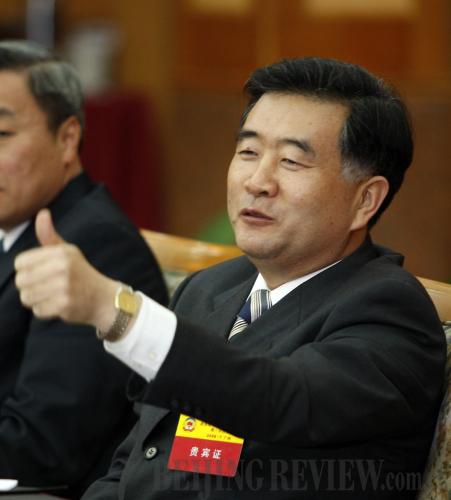|
 |
|
(CFP) |
Wang Yang, Secretary of the CPC Guangdong Provincial Committee and a member of the Politburo of the CPC Central Committee, has been a rising political star in China. Wang, a native of Suzhou, Anhui Province, is widely considered one of the most innovative thinkers among Chinese high-ranking officials today.
After assuming office in 2007, he has put to good use his leadership prowess and experimented with new reform and opening-up measures in China's pioneering province. He called for another round of "mind emancipation": finding a new growth model and reconnecting Guangdong's manufacturing to the world in a technology-intensive fashion. Guangdong has long rested at the lower end of the production chain, although it has been an integral part of the global economy for some time.
Guangdong has been China's top economic powerhouse, in terms of GDP, for 21 consecutive years. But its growth over the last three decades has been dominated by export-oriented manufacturing based on low labor cost and cheap energy supplies. With rising labor costs and energy prices, and increasing concern for environmental protection, the relevance and sustainability of this growth pattern is dwindling.
Now, the province is engineering a fundamental shift from being part of the world workshop to a center of technological innovation.
To do this, Wang wants to upgrade Guangdong's industrial structure through what is being called a "dual transfer"—shifting low-wage manufacturing along with employment out of the much-developed Pearl River Delta to China's underdeveloped interior regions. He's also trying to attract hi-tech industries and services to the delta region to set up a low-carbon economy.
Wang has challenged Guangzhou, the provincial capital, and the city of Shenzhen, a paradise for startup companies, to look outward and emulate prominent business centers in Singapore and South Korea.
Instead of toting Guangdong's success stories, Wang has been identifying the province's problems and urging local officials to focus on more comprehensive, coordinated and sustainable development, to establish a global vision and, most importantly, to pay more attention to people's livelihoods.
Revitalizing Guangdong's cultural and creative industries is also among the top items on Wang's agenda. To boost the sectors' competitiveness, he has pledged fiscal investments worth up to 25 billion yuan ($3.7 billion) in the next five years (2011-15). The money will partly be used to construct public cultural facilities in rural and urban areas.
Wang served as Secretary of the CPC Chongqing Municipal Committee in southwest China between 2005 and 2007. He was elected a member of the Politburo of the CPC Central Committee at the 17th Party Congress in October 2007. Wang replaced Zhang Dejiang as the Secretary of the CPC Guangdong Provincial Committee in December the same year.
| 